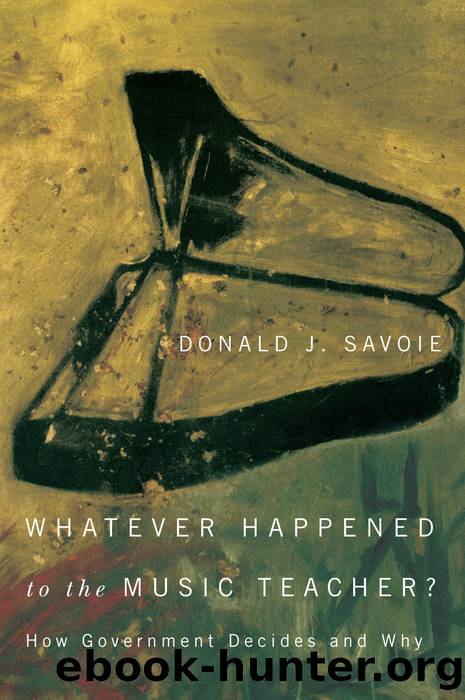Whatever Happened to the Music Teacher? by Savoie Donald J.;

Author:Savoie, Donald J.;
Language: eng
Format: epub
Publisher: McGill-Queen's University Press
Published: 2013-08-15T00:00:00+00:00
So Why Is This So?
There are fundamental conceptual problems with program evaluation that have never been resolved, and prospects for their resolution are dim. This is not limited to Canada. A recent review in Australia reveals that government departments there âcontinue to find it challenging to develop and implement performance indicators, in particular effectiveness indicators that provide quantitative and measureable information, allowing for an informed and comprehensive assessment and reporting of achievements against stated objectives.â45
When one combines fundamental conceptual problems that have never been addressed in program evaluation with the conviction that public servants cannot be fully trusted when it comes to establishing expenditure budgets (again, witness the recent government decision to contract-out advice on the strategic and operating review), one sees why politicians have given up on the ability of public servants to generate ideas for cutting spending. Indeed, evidence-based policy making appears to have taken a back seat in Ottawa to policy making based on political ideology, on political commitments made during election campaigns, and, at times, on the whims and wishes of the prime minister (see, for example, Chrétien and the Millennium Scholarship Fund).46 The Harper governmentâs crime legislation and its inability to support it through evidence or to provide a proper costing speaks to how new spending commitments are decided today.
New spending is only the tip of the iceberg. The problem with public sector budgeting is not so much what government spends on new measures but its apparent inability to stop spending on measures that have long passed their âbest byâ date. This is where public servants and their outside consultants, producing reams of program evaluation reports and various performance review assessments, have been kept busy turning a crank that is not attached to anything.
Why is this so? Which of the theories outlined earlier explain the fact that senior public servants would happily continue to turn cranks not attached to anything? Does public choice theory explain this behaviour? What about path dependency and new institutionalism? The theories â especially path dependency, tied as it is to the study of institutions â certainly hold merit in understanding the continuing efforts at program evaluation, with little to show in terms of rethinking or financing ongoing programs.
I decided to consult decision makers in line departments for their thoughts. Most put up a lukewarm defence of program evaluation, making the point that one ought not to look at it from the narrow perspective of seeing which programs died or were enriched because of it. They admitted that program evaluation has been useful on occasion. Some asked, What do you suggest â that we do not evaluate programs? But they acknowledged its weaknesses as a management tool and had precious few concrete examples to show that it had made a positive contribution.47 There was also the sense that someone else is responsible for program evaluation, and there is little that line department officials can do about it. One senior deputy minister summed it up well when he observed, âYou have to pick your battles and what to do about program evaluation is never even near the top of my list.
Download
This site does not store any files on its server. We only index and link to content provided by other sites. Please contact the content providers to delete copyright contents if any and email us, we'll remove relevant links or contents immediately.
The Secret History by Donna Tartt(19052)
The Social Justice Warrior Handbook by Lisa De Pasquale(12187)
Thirteen Reasons Why by Jay Asher(8893)
This Is How You Lose Her by Junot Diaz(6877)
Weapons of Math Destruction by Cathy O'Neil(6264)
Zero to One by Peter Thiel(5786)
Beartown by Fredrik Backman(5737)
The Myth of the Strong Leader by Archie Brown(5499)
The Fire Next Time by James Baldwin(5431)
How Democracies Die by Steven Levitsky & Daniel Ziblatt(5215)
Promise Me, Dad by Joe Biden(5141)
Stone's Rules by Roger Stone(5081)
A Higher Loyalty: Truth, Lies, and Leadership by James Comey(4954)
100 Deadly Skills by Clint Emerson(4921)
Rise and Kill First by Ronen Bergman(4779)
Secrecy World by Jake Bernstein(4741)
The David Icke Guide to the Global Conspiracy (and how to end it) by David Icke(4701)
The Farm by Tom Rob Smith(4502)
The Doomsday Machine by Daniel Ellsberg(4484)
